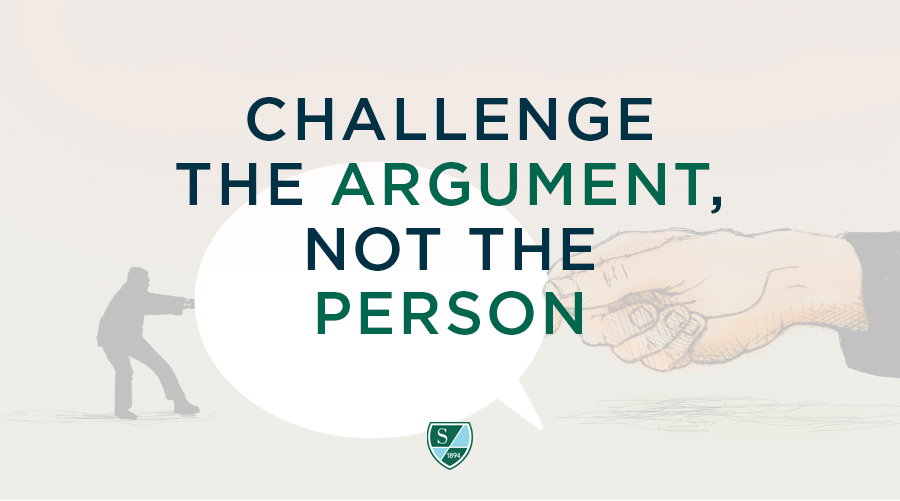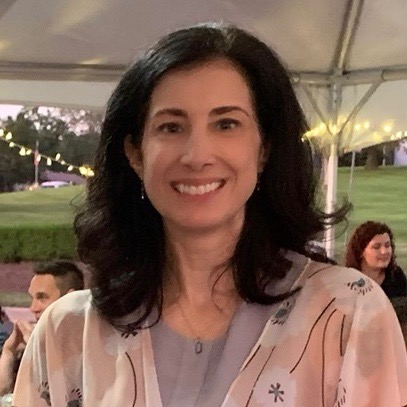So, how’s everyone recovering from the wild ride that was 2020? A global pandemic and the resulting extended period of isolation, uncertainty, and widespread anxiety have worn us all down. To top it off, a schism has resurfaced in American society as an old wound was ripped open and escalated to levels of vitriol and violence not seen here in decades. How did this happen? Why is everyone so bitterly divided? I recently saw a video on TikTok which expressed a simple yet profound thought that has helped me give an answer to my two sons when they ask these complicated questions (and it makes me very cool to have my finger on the zeitgeist of the moment, so that’s a plus). The man in the video explained the difference between challenging someone’s argument rather than challenging them as a person.
We all know that algorithms determine what we see in our news feeds, based on what we’ve clicked or searched. Algorithms are mysterious and incomprehensible to me. Shipley has some brilliant math teachers who may be able to explain how they work, but I am not a brilliant math person. All I know is that algorithms feed us more of what we choose - we click a link, we receive more links to articles that reinforce the philosophies that we already espouse. This causes us to believe that the whole world agrees with us, so we drill down into the thinking that we are irrefutably right and that anyone who disagrees with us is irrefutably wrong. This leads to judgement and condemnation of people who believe differently than we do. This is equally true on both sides of the political divide. For the record, I fall on the side of antiracism and faith in science. At this point, I wonder if half of the people reading this essay will dismiss my opinions and move on to another article. I hope not. We have no right to judge anyone based on their ideas. Make no mistake - spreading hate, spitting verbal fire online or in person, refusing to listen, and violence are certainly condemnable because they are choices. Actions. And not what we’re talking about here. Not. At. All.
Diversity, Equity, and Inclusion (DEI) and Positive Education philosophy are rooted in the willingness to have “difficult conversations” and to listen respectfully to others, to thoughtfully consider everyone’s point of view. Sometimes we find something we relate to, and sometimes we reach the conclusion that someone’s mentality is illogical, unrealistic, or just plain wrong. And that’s ok, as long as we remember not to judge or attack the person. Nobody is 100% right or wrong. Nobody is 100% good or bad. Nobody is 100% anything, and as long as we remember that, there is a better chance of listening to them with an open mind. We can consider their upbringing, the community in which they live, their overall life experience, and how those things shape their ideology. We can learn to stay quiet and formulate our responses so that they challenge the argument, rather than the person. We can say “I don’t agree with that” instead of “You’re wrong. You’re stupid. You’re obviously a clueless, bad person.” It takes restraint and patience - we are dealing with a relentless assault of emotionally charged issues. The stakes have never been higher - public health, American government, and social justice - and it’s all we talk about because we are all in the same, unsolvable situation. And we’re all stuck inside, so we have nothing else going on. No distractions.
As I mentioned, I don’t absolutely subscribe to one political ideology, but in the area of social concerns, I am decidedly liberal, and yet I am friends with some very right-minded, conservative folks. How can this be? Because when we listen without prejudice (ah, George Michael, rest in peace), we can be friends with those whose values don’t perfectly align with our own. Conservatives and liberals can be friends, because nobody is 100% anything. There will usually be an area of common ground where friendships can live. As for the tough stuff, we can allow our opposing ideas to live in their separate rooms and not get in the way of positive interactions.
I share some of the conversations I have with my conservative friends with my children, in an attempt to model reasonable discourse and considering people as more than their politics, especially in the current climate. I am far from perfect - sometimes I succeed in having enlightening conversations and other times, discussions have devolved into bitter and hurtful arguments with people I care about, even love. But practice makes progress. Practice makes proficiency. Note, practice does not make perfect. Perfect is unattainable and unrealistic. However, practice does eventually make permanence, so we must be mindful of the attitudes we’re practicing. But if I’m afraid to speak up, no progress can be made. That’s the message I want to impart to my children, that we can both advocate for our causes and learn about other approaches.
Over the holidays, as I was busy making gifts for friends, my younger son asked who one of them was for. When I told him, he said he thought she was one of the conservative friends I'd mentioned in our conversations about different viewpoints. It took him a solid few minutes to understand why I would still want to give my friend a present, and how I could feel good will towards someone who disagrees with me on issues that are so fundamental to my family’s core values. But that’s the point, isn’t it? To disagree with my friend’s ideas, not dismiss her as a person, and to focus on the things that I love about her while respecting our differences. Who knows - she might even consider my point of view and discover a new perspective on a heated subject. At the very least, I can hope to plant a seed that might grow into a new branch of thought. Perhaps she will do the same for me. So, kids (and adults), challenge the thought and respect the person. Consider that we are all complicated individuals who are the product of our life experiences, and treat each other with grace. Actively search out information about the opposite side of an argument, because the Internet is not going to give it to you. You are going to inherit a complicated world, but you will be up for the challenge. And oh yeah, here’s the link to that TikTok video. Never let it be said that I am not cool.
Thanks for listening,
Corine Sheng
Learn more about Diversity, Equity, and Inclusion at Shipley.










